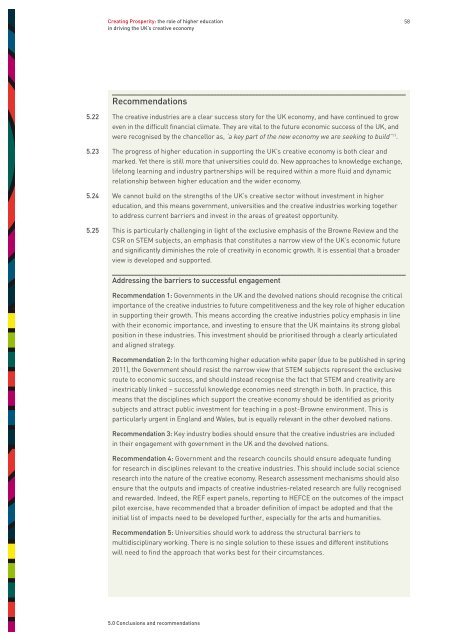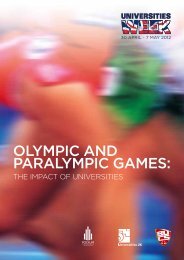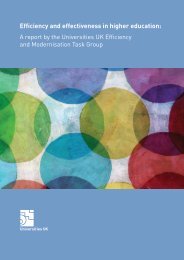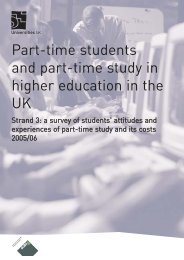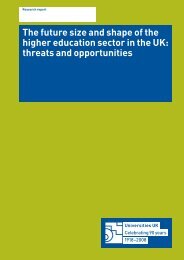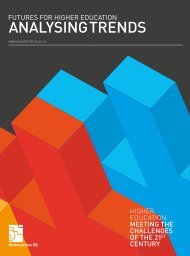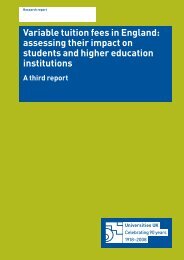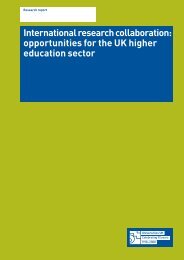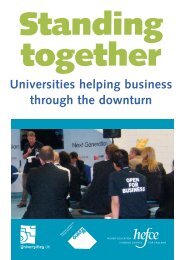Creating Prosperity: the role of higher education in ... - Universities UK
Creating Prosperity: the role of higher education in ... - Universities UK
Creating Prosperity: the role of higher education in ... - Universities UK
You also want an ePaper? Increase the reach of your titles
YUMPU automatically turns print PDFs into web optimized ePapers that Google loves.
<strong>Creat<strong>in</strong>g</strong> <strong>Prosperity</strong>: <strong>the</strong> <strong>role</strong> <strong>of</strong> <strong>higher</strong> <strong>education</strong><strong>in</strong> driv<strong>in</strong>g <strong>the</strong> <strong>UK</strong>’s creative economy58Recommendations5.22 The creative <strong>in</strong>dustries are a clear success story for <strong>the</strong> <strong>UK</strong> economy, and have cont<strong>in</strong>ued to groweven <strong>in</strong> <strong>the</strong> difficult f<strong>in</strong>ancial climate. They are vital to <strong>the</strong> future economic success <strong>of</strong> <strong>the</strong> <strong>UK</strong>, andwere recognised by <strong>the</strong> chancellor as, ‘a key part <strong>of</strong> <strong>the</strong> new economy we are seek<strong>in</strong>g to build’ 11 .5.23 The progress <strong>of</strong> <strong>higher</strong> <strong>education</strong> <strong>in</strong> support<strong>in</strong>g <strong>the</strong> <strong>UK</strong>’s creative economy is both clear andmarked. Yet <strong>the</strong>re is still more that universities could do. New approaches to knowledge exchange,lifelong learn<strong>in</strong>g and <strong>in</strong>dustry partnerships will be required with<strong>in</strong> a more fluid and dynamicrelationship between <strong>higher</strong> <strong>education</strong> and <strong>the</strong> wider economy.5.24 We cannot build on <strong>the</strong> strengths <strong>of</strong> <strong>the</strong> <strong>UK</strong>’s creative sector without <strong>in</strong>vestment <strong>in</strong> <strong>higher</strong><strong>education</strong>, and this means government, universities and <strong>the</strong> creative <strong>in</strong>dustries work<strong>in</strong>g toge<strong>the</strong>rto address current barriers and <strong>in</strong>vest <strong>in</strong> <strong>the</strong> areas <strong>of</strong> greatest opportunity.5.25 This is particularly challeng<strong>in</strong>g <strong>in</strong> light <strong>of</strong> <strong>the</strong> exclusive emphasis <strong>of</strong> <strong>the</strong> Browne Review and <strong>the</strong>CSR on STEM subjects, an emphasis that constitutes a narrow view <strong>of</strong> <strong>the</strong> <strong>UK</strong>’s economic futureand significantly dim<strong>in</strong>ishes <strong>the</strong> <strong>role</strong> <strong>of</strong> creativity <strong>in</strong> economic growth. It is essential that a broaderview is developed and supported.Address<strong>in</strong>g <strong>the</strong> barriers to successful engagementRecommendation 1: Governments <strong>in</strong> <strong>the</strong> <strong>UK</strong> and <strong>the</strong> devolved nations should recognise <strong>the</strong> criticalimportance <strong>of</strong> <strong>the</strong> creative <strong>in</strong>dustries to future competitiveness and <strong>the</strong> key <strong>role</strong> <strong>of</strong> <strong>higher</strong> <strong>education</strong><strong>in</strong> support<strong>in</strong>g <strong>the</strong>ir growth. This means accord<strong>in</strong>g <strong>the</strong> creative <strong>in</strong>dustries policy emphasis <strong>in</strong> l<strong>in</strong>ewith <strong>the</strong>ir economic importance, and <strong>in</strong>vest<strong>in</strong>g to ensure that <strong>the</strong> <strong>UK</strong> ma<strong>in</strong>ta<strong>in</strong>s its strong globalposition <strong>in</strong> <strong>the</strong>se <strong>in</strong>dustries. This <strong>in</strong>vestment should be prioritised through a clearly articulatedand aligned strategy.Recommendation 2: In <strong>the</strong> forthcom<strong>in</strong>g <strong>higher</strong> <strong>education</strong> white paper (due to be published <strong>in</strong> spr<strong>in</strong>g2011), <strong>the</strong> Government should resist <strong>the</strong> narrow view that STEM subjects represent <strong>the</strong> exclusiveroute to economic success, and should <strong>in</strong>stead recognise <strong>the</strong> fact that STEM and creativity are<strong>in</strong>extricably l<strong>in</strong>ked – successful knowledge economies need strength <strong>in</strong> both. In practice, thismeans that <strong>the</strong> discipl<strong>in</strong>es which support <strong>the</strong> creative economy should be identified as prioritysubjects and attract public <strong>in</strong>vestment for teach<strong>in</strong>g <strong>in</strong> a post-Browne environment. This isparticularly urgent <strong>in</strong> England and Wales, but is equally relevant <strong>in</strong> <strong>the</strong> o<strong>the</strong>r devolved nations.Recommendation 3: Key <strong>in</strong>dustry bodies should ensure that <strong>the</strong> creative <strong>in</strong>dustries are <strong>in</strong>cluded<strong>in</strong> <strong>the</strong>ir engagement with government <strong>in</strong> <strong>the</strong> <strong>UK</strong> and <strong>the</strong> devolved nations.Recommendation 4: Government and <strong>the</strong> research councils should ensure adequate fund<strong>in</strong>gfor research <strong>in</strong> discipl<strong>in</strong>es relevant to <strong>the</strong> creative <strong>in</strong>dustries. This should <strong>in</strong>clude social scienceresearch <strong>in</strong>to <strong>the</strong> nature <strong>of</strong> <strong>the</strong> creative economy. Research assessment mechanisms should alsoensure that <strong>the</strong> outputs and impacts <strong>of</strong> creative <strong>in</strong>dustries-related research are fully recognisedand rewarded. Indeed, <strong>the</strong> REF expert panels, report<strong>in</strong>g to HEFCE on <strong>the</strong> outcomes <strong>of</strong> <strong>the</strong> impactpilot exercise, have recommended that a broader def<strong>in</strong>ition <strong>of</strong> impact be adopted and that <strong>the</strong><strong>in</strong>itial list <strong>of</strong> impacts need to be developed fur<strong>the</strong>r, especially for <strong>the</strong> arts and humanities.Recommendation 5: <strong>Universities</strong> should work to address <strong>the</strong> structural barriers tomultidiscipl<strong>in</strong>ary work<strong>in</strong>g. There is no s<strong>in</strong>gle solution to <strong>the</strong>se issues and different <strong>in</strong>stitutionswill need to f<strong>in</strong>d <strong>the</strong> approach that works best for <strong>the</strong>ir circumstances.5.0 Conclusions and recommendations


